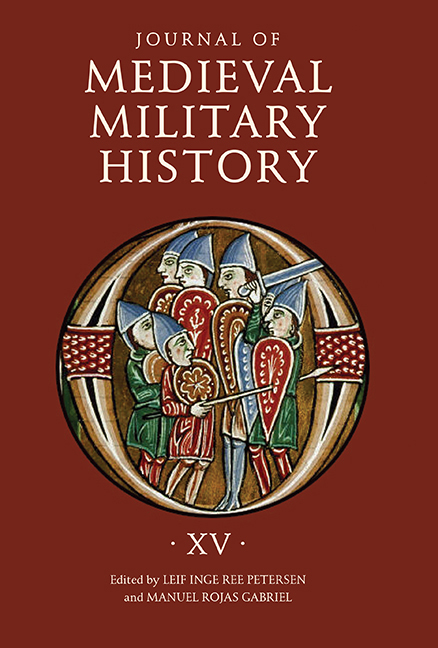Book contents
- Frontmatter
- Dedication
- Contents
- List of Illustrations
- Preface
- 1 Later Roman Grand Strategy: The Fortification of the urbes of Gaul
- 2 In Search of Equilibrium: Byzantium and the Northern Barbarians, 400–800
- 3 Evolving English Strategies during the Viking Wars
- 4 Norman Conquests: A Strategy for World Domination?
- 5 The Papacy and the Political Consolidation of the Catalan Counties, c. 1060–1100: A Case Study in Political Strategy
- 6 Alfonso VII of León-Castile in Face of the Reformulation of Power in al-Andalus, 1145–1157: An Essay in Strategic Logic
- 7 The Treaties between the Kings of León and the Almohads within the Leonese Expansion Strategy, 1157–1230
- 8 A Strategy of Total War? Henry of Livonia and the Conquest of Estonia, 1208–1227
- 9 The English Longbow, War, and Administration
- List of Contributors
- Journal of Medieval Military History
- De Re Militari and the Journal of Medieval Military History
6 - Alfonso VII of León-Castile in Face of the Reformulation of Power in al-Andalus, 1145–1157: An Essay in Strategic Logic
Published online by Cambridge University Press: 21 August 2019
- Frontmatter
- Dedication
- Contents
- List of Illustrations
- Preface
- 1 Later Roman Grand Strategy: The Fortification of the urbes of Gaul
- 2 In Search of Equilibrium: Byzantium and the Northern Barbarians, 400–800
- 3 Evolving English Strategies during the Viking Wars
- 4 Norman Conquests: A Strategy for World Domination?
- 5 The Papacy and the Political Consolidation of the Catalan Counties, c. 1060–1100: A Case Study in Political Strategy
- 6 Alfonso VII of León-Castile in Face of the Reformulation of Power in al-Andalus, 1145–1157: An Essay in Strategic Logic
- 7 The Treaties between the Kings of León and the Almohads within the Leonese Expansion Strategy, 1157–1230
- 8 A Strategy of Total War? Henry of Livonia and the Conquest of Estonia, 1208–1227
- 9 The English Longbow, War, and Administration
- List of Contributors
- Journal of Medieval Military History
- De Re Militari and the Journal of Medieval Military History
Summary
The following pages will try to prove two basic points. The first of these is that the military operations which Alfonso VII of León-Castile (1126–57) undertook against the Muslims during the long decade between 1145 and 1157 were not random events. These acts of war rather followed the logical strategic guidelines that arose from the readjustment to a new political situation in al-Andalus, of the plan the monarch had been developing since c. 1130 for a gradual attrition of the basis of Almoravid power within the Iberian peninsula. The second point is that Alfonso's conquest of Almería in 1147, and his concern to keep the city under his control down to its loss in 1157, did not spring from crusading ideals, still less from what an influential historiographical trend of recent decades has designated the “international” movement of the Second Crusade. On the contrary, this entire episode was just a product of dynamic strategies in the light of regional concerns.
Background and Context
Alfonso VII is not normally remembered for his military or political achievements against the Muslims. With regard to León and Castile Alfonso VI (1065/72–1109), who conquered the city of Toledo (1085) and dominated the taifa kingdoms, Alfonso VIII (1158–1214), who defeated the Almohads at the famous battle of Las Navas de Tolosa (1212), and Fernando III “the Saint” (1217/30–52), who subdued the territorial heart of al-Andalus, spring more readily to mind. With regard to Aragón, Alfonso I “the Battler” (1104–34), who conquered Zaragoza (1118) and frequently defeated the Almoravids at the height of their military power, and Jaime I (1213–76), accurately named “the Conqueror,” who took Mallorca and Valencia, enjoy similar fame. Another king who deserves to be regarded as a great military leader was Afonso Henriques of Portugal (1139–85) who, within four decades, doubled the territories he had inherited by fighting against the Muslims.
Nevertheless, any contemporary of Alfonso VII would without any doubt have described him as a monarch of formidable stature. Indeed, in 1135 Alfonso was proclaimed emperor on account of the homage he received from every other Christian leaders within the Iberian peninsula and from some beyond the Pyrenees. Until his death in 1157 nobody questioned this status.
- Type
- Chapter
- Information
- Journal of Medieval Military HistoryStrategies, pp. 118 - 149Publisher: Boydell & BrewerPrint publication year: 2017

